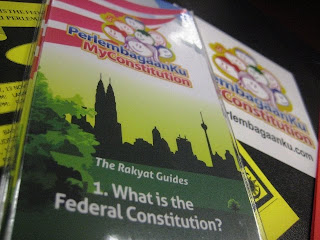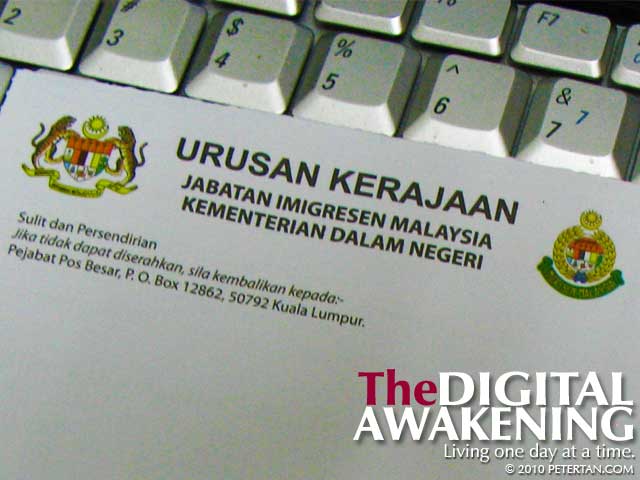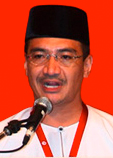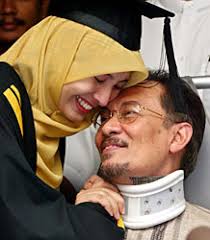 |
| Nurul - a chip off the old block |
Nurul Izzah Anwar
KUALA LUMPUR - Since I wrote my August 31, 2010 article, titled “The Ultimate Malaysian Debate: Malaysia or Malaysaja?”, which called for a constructive engagement with Perkasa, and with the stated purpose to seek clarification and not challenge or repeal the constitution, my invitation to Perkasa has not only been rejected but countless accusations and police reports were made against me.
I believe as a democracy, that all opinions made related to the article — which I hope was not lost in translation — is accepted and responded to with thanks.
With that, I invite everyone to read the full article again.
I stand by that article and will remain a Malaysian Patriot forever.
I also recommend that the Malaysian Constitution be read in conjunction with the Articles mentioned. For brevity, the fantastic MyConstitution brochures produced by the Malaysian Bar Council are also very helpful.
Part 2: Clarifying and Reconciling the Constitution
In the interest of framing the context of my concerns for the state of our nation, I have written this sequel.
I wish to continue in the path of constructive engagement with all concerned Malaysians.
I again reaffirm that I only seek clarifications and not to challenge or ask to repeal our constitution.
I have decided to make a list of issues concerning “Malay Rights”, that needs to be clarified and reconciled between the mixed government policy signals over the years in relation to Article 153, Article 152, Article 89 and the NEP.
The main contention for clarification is that, how do we reconcile between the need for change to meet current circumstances facing the nation today and the constitution — the raison d’etre of my proposed debate with Perkasa for a better Malaysia?
The list, where all the information is available as a matter of public record, is as follows:
Part XII, General and Miscellaneous — Article 153 — Reservation of quotas in respect of services, permits, etc., for Malays and natives of any of the States of Sabah and Sarawak.
Article 153 contains a quota mechanism in the form of Article 153 (2)... the Yang di-Pertuan Agong shall exercise his functions under this Constitution and federal law... to ensure the reservation for Malays and natives of any of the States of Sabah and Sarawak of such proportion as he may deem reasonable for:
• positions in the public service (other than the public service of a State)
• scholarships, exhibitions and other similar educational or training privileges or special facilities given
• permit or licence for the operation of any trade or business is required by federal law, then, subject to the provisions of that law and this Article, of such permits and licences.
Position in Public Service Quota
In regards to “position in the public service”, in 2009, 78.2 per cent of public service positions are composed of Malays and 7.7 per cent other Bumiputeras for a total of 85.9 per cent.
However, it is reassuring that measures have been introduced to recruit more non-Malays into the civil service.
How do we reconcile this with the need for diversity and fair racial representation without diminishing “Malay Rights”?
Scholarship Quota
In regards to scholarships for Malays and natives of Sabah and Sarawak, I would like to propose that more scholarships should be given as education is a great equaliser and facilitates social mobility; hence shouldn’t all PTPTN student loans be converted to scholarships to fulfil Article 153 intent?
And as a sustainable source of funds for more scholarships, shouldn’t Petronas oil revenue have a specific 30 per cent of profits mandated for scholarships, this would definitely be putting our “Khazanah Negara: (national treasure, i.e. oil) to develop our most treasured resources: our children?
Wouldn’t it also be an exercise in good governance and in the interest of “Malay Rights”, if Petronas accounts are made public and accountable through the Parliament?
I do believe with Petronas mandated scholarship contribution, even all deserving top scorers, regardless of race can receive a scholarship that will enrich the quality of our human resource and foster national unity to achieve higher economic growth; to improve the quality of our current workforce, 80 per cent of which are SPM holders.
Wouldn’t this enhance “Malay Rights”?
Public University Admission Quota
We should also look at how Article 153 (2) is to be reconciled, with the change of policy from a quota-based to a meritocracy-based admissions system to public universities made by then prime minister Tun Dr Mahathir Mohamad in 2003?
Wouldn’t this lead to efforts to continue improving our education system or just be seen as limiting access to public universities? Which is the priority?
Permits and Licenses for Business and Trade Quota
In regards to permits or licences for trade or business, how can it be reconciled with the initiative of Prime Minister Datuk Seri Najib Razak’s act to liberalise 27 sub-sectors within the services sector?
Would this impact “Malay Rights” positively or negatively, in terms of creating market efficiencies through competition which will grow the economy or have market protection that limits growth?
Part XII, General and Miscellaneous — Article 152 — National Language
Article 152 (1) ...The national language shall be the Malay language.....
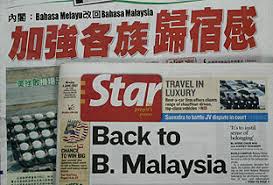
How do we reconcile between the need for change and the constitution with the earlier initiative to teach Science and Maths in English in national schools by prime minister Mahathir in 2003, which now has been reversed back to being taught in Bahasa Malaysia?
As a note to the ability of the courts to interpret on the constitution, this year in a test case brought by four students, a High Court has ruled that it is constitutional to teach Mathematics and Science in English. [1]
Indeed, is it safe to surmise that the constitution can be reconciled with the needs of the times, as shown in the PPSMI case?
Part VI, Chapter 4 — Land; Article 89 — Malay Reserve Land
Article 89 refers to Malay Land Reservation matters, how can it be reconciled with the government’s proposal to establish the Kampung Baru Development Corp, with a yet to be finalised 60:40 ratio for Malay and non-Malay participation in property development (and ownership?) made by the Federal Territories and Urban Wellbeing Minister?
Wouldn’t this reduce “Malay Rights” in terms of landholdings, but how do we unlock the value of these lands for productive uses? Which should be the priority?
In the matter of the poverty eradication regardless of race, absolute poverty in the population as a whole dropped from 49.7 per cent in 1970 to 3.8 per cent in 2009, according to the 10th Malaysia Plan government statistics.
In real numbers this means that 228,400 households or 1,004,960 Malaysian live on an average of RM800 per household a month and below.
However, if we use a more realistic and reasonable measurement methodology for determining the Poverty Line Income (PLI) which is defined as income that is necessary to buy a group of foods that would meet the nutritional needs of the members of a household and other basic necessities such as clothing, rent, fuel and utilities, transport and communications, medical expenses, education and recreation, then according to Jayanath Appudurai, who writes extensively on poverty for the Centre for Policy Initiatives, suggest that Malaysia calculates the PLI based on two-thirds of the median income of its households. The median income is a country’s total income divided by half which is RM2,830 for Malaysia. Therefore, Malaysia’s PLI for 2010 based on two-thirds of the median income, should be RM1,886 rather than the government’s PLI average of RM800 per household. [2]

Based on RM800 per month per household of 4.4 people, then the daily amount needed to live is RM6.00 per person as compared to an income of RM 1,886 per month which would provide a daily average of RM14.00 per person to cover basic necessities.
What is the price of one chicken today? Has food prices increased? Is living getting more expensive while job opportunities and incomes are stagnant or declining? Are we losing our purchasing power day by day?
With a more realistic and reasonable PLI, it would mean that 32 per cent or 1,923,368 households with 8,463,821 million Malaysians are living below the poverty line.
And mind you, by some estimates it requires a monthly income of RM3,000 to barely live in Kuala Lumpur. However, should we take heed of a minister’s advice to cut overheads such as Astro and cars to survive?
Furthermore, our Gini Coefficient index which is a measurement of income inequality, where an index of 0 means perfect income equality and an index of 1 means perfect income inequality, in 2009 is 46.1 and ranked 35 among other nations. Will it go any higher to an index of 1?
Therefore, the first step should be to review the Poverty Line Income (PLI) for Malaysia to a realistic and reasonable measurement, and use it to set urgent corrective and doable policies which have been suggested by Pakatan Rakyat, such as:
• A living income policy that will realign our labour market towards a higher-income nation.
• To review the major utilities concessions that will bring down living costs.
• To strictly implement anti-monopoly laws without fear or favour.
• To expand micro-credit facilities for small business development.
• To provide targeted subsidies for essential goods and services for deserving households.
• To implement a transparent government procurement practice to avoid wastages and leakages that drives up economic cost that burden the poor more.
• And for good measure, to provide even more scholarships and convert existing PTPTN student loans for these households into scholarships.
Can all these be done to assist the households that would be termed to be in poverty, which are majority Bumiputeras, with the more realistic and reasonable PLI, as part of “Malay Rights” struggle?
The Lembah Pantai MP highlighted four conflicting accounts of Malay equity under the NEP.
NEP — Corporate Equity Ownership Goal
Has the Bumiputera corporate equity ownership reached 18.9 per cent or more than 30 per cent in 2006?
These are the four studies or reports on the matter.
In the first study, a 2002 University of Malaya research entitled “Bumiputeras in the Corporate Sector — Three decades of performance 1970-2000″, by Dr M. Fazilah Abdul Samad, head of department of finance and banking in the Faculty of Business and Accountancy, has concluded that the 30 per cent Bumiputera equity ownership as targeted under the NEP had been achieved in 1997.
The research was based on a 10-year analysis of Bumiputera equity ownership between 1988 and 1997 of public listed companies on the Kuala Lumpur Stock Exchange (KLSE), now called Bursa Malaysia. It is important to note, that the study used par value of KLSE listed companies as the basis of calculation.
Bumiputera equity ownership reached 33.7 per cent in 1997, comprising 30.6 per cent Bumiputera corporate equity ownership and 3.1 per cent individual Bumiputera share ownership. This does not include nominee company ownership which could be held in the majority on behalf of Bumiputeras.
In a second study in 2006, the Asian Strategic Leadership Institute (Asli) also released a study that showed that Bumiputera ownership of corporate equity in the Kuala Lumpur Stock Exchange had exceeded the 30 per cent target.
The findings of a 45 per cent Bumiputera equity ownership share were based on a different method of measurement compared with the official one. It used market value as opposed to the par value valuation official method, and allocating the equity of GLCs according to racial composition.
In a third study, also in 2006 and in spite challenging the validity of both the UM and Asli reports of exceeding the 30 per cent target, the government had inadvertently announced on Novermber 7, 2006, that Bumiputeras indeed owned 36.6 per cent or RM78.4 billion in shareholding value in companies listed on the main board and second board of Bursa Malaysia up to December 31 2005.
Deputy Finance Minister Datuk Dr Awang Adek Hussin said shareholding by non-Bumiputeras stood at RM100.4 billion (46.9 per cent) while another RM55.2 billion (16.45 per cent) was held by foreigners.
However, this initial report was later retracted by another qualifying report, which is our fourth report, was released.
The fourth study in 2006, attempted to explain the official NEP statistics calculation methodology. It was reported (published here in its entirety as to understand the full context of the subject) that:
“The Malaysian government has released details on how it calculates the Malay share of corporate ownership following a controversy over this statistic, which is crucial for the continuation of pro-Malay policies.
 |
| Izzah - time waits for no woman or MP |
The Asian Strategic Leadership Institute (Asli) sparked a debate last month when it said Malays already owned 45 per cent of business equity, ahead of the government target of 30 per cent by 2020.
This was seen as challenging the government’s affirmative action policy. Official statistics put Malay corporate ownership at 18.9 per cent.
Following the controversy, the government promised to reveal how it had arrived at its statistics.
The Deputy Minister in the Prime Minister’s Department Rahman Suliman disclosed the methodology in Parliament on Tuesday, ahead of next week’s Umno general assembly, where the issue of Malay economic progress is expected to be debated.
He said the government based its calculations on the 609,625 registered companies and not just the 1,000-plus public listed ones.
Based on listed companies, the Bumiputera share would be 36.6 per cent as at December 31 last year. This is because all such companies must have at least 30 per cent Malay ownership.
In the case of registered companies, only 24 per cent are controlled by Malays, said Datuk Rahman.
Secondly, the government uses the par, or nominal, value of the shares held, and not the market value, as this gives a better picture, he said.
Datuk Rahman said market value could be used for listed companies, but for the other companies, this could be manipulated easily.
“But the government is always open to reviewing the methodology,” he said.
The Asli study used market value because it believed that this reflected the actual value of the company.
Datuk Rahman addressed criticisms that the government failed to count as Malay the shareholdings of GLCs and shares held by nominee companies and trustee companies.
He said it had taken into account shares held by companies like Permodalan Nasional, set up to raise Malay involvement in business, and unit trusts open only to Malays.
It also counted shares held by nominee companies, most of which were owned by non-Bumiputeras.
As for GLCs, he said shares held by the Employees Provident Fund, Khazanah Holdings and Minister of Finance Inc are not classified as held by any particular ethnic group.
He said the government’s data covered only corporate equity in Malaysia and not wealth held overseas.
Datuk Rahman also said Malays owned less than 12 per cent of urban commercial properties, while Chinese held 72 per cent and Indians 5 per cent.
These last two statements are telling. It shows the government has expanded its parameters for equitable wealth distribution beyond the usual yardsticks of corporate equity, household income and employment.
Property ownership, especially commercial assets, and overseas holdings are also now a factor.
Asli director Tan Sri Ramon Navaratnam told The Straits Times: “I hope the government will broaden the spectrum of experts to include academicians and the private sector to provide a wider perspective when they review the methodology.”
Opposition Democratic Action Party secretary-general Lim Guan Eng criticised the use of par value calculation and said market value gave a more accurate picture.
Kemaman MP Ahmad Shabery Cheek told online news portal Malaysiakini that affirmative action was still needed to bridge income disparity between races. However, the government is adamant that the NEP should be continued. Earlier, it had rejected two reports from Asli and UM which suggested that Bumiputera corporate equity ownership is more than 30 per cent.”[3]
It would appear in summary that there are four Bumiputera equity ownership share reports with different conclusions and methodologies, the UM report puts it at 33.7 per cent (using par-value method of listed companies), the ASLI report shows it at 45 per cent (using market-value of listed companies and GLCs race apportioned method), the Deputy Finance Minister’s statement is 36.6 per cent (using market value of listed companies) and the Deputy Minister in the Prime Minister’s Department places it at the official 18.9 per cent (using par-value of listed and all non-listed companies excluding all GLCs and Government Managed Financial Institutions except PNB).
So has the Bumiputera corporate equity ownership reached 18.9 per cent or more than 30 per cent in 2006?
Which valuation method should be used?
Regardless of valuation method, what the reports fail to show is that which Bumiputeras own all this wealth? How was it allocated?
And how can we explain the NEP Equity leakage of RM52 billion that was sold off?
Shouldn’t the focus for the sake of “Malay Rights”, be on the improving the mode of NEP or progressive NEM implementation and share allocation to include more Malays rather than to only a few individuals?
Shouldn’t our efforts for the sake of “Malay Rights”, be on strengthening the diminishing “enabling” factors to equitable and sustainable economic growth, caused by cronyism, corruption, wastages, leakages, wrong resource allocations (big projects phenomenon), racism, anti-democratic laws and state institutional degradation and abuse, that in reality subverts and undermine achieving the well intended NEP or progressive NEM goals?
Therefore, I want to suggest that to correct this NEP wealth distribution dilemma, and in the interest of “Malay Rights”, a new mechanism be applied on existing Bumiputera equity holdings in both listed and non-listed, especially government vendors, privatisation, utilities and concession holder companies (which is in line with official Bumiputera Equity Share calculation methodology), whereby, 30 per cent of current ownership be divested on a par-value basis (since this is the official method of calculating equity value held), in the following portions; 25 per cent to a Bumiputera Education Fund for more scholarships, and the remaining five per cent to a Bumiputera employee-owned co-operative of the participating company.
As for financing the par-value shares purchases, to compensate the current Bumiputera equity owners, the beneficiaries should apply for a loan from Bank Bumiputra Berhad which is a financial institution created from the Bumiputera Economic Congress, and as the bank no longer exist, then they should apply to CIMB instead.
This mechanism can be called the “Bumiputera NEP Equity — Quota in a Quota — Redistribution Program”, where the current Bumiputera equity owner will still be left with a 70 per cent stake of his current holdings and the 30 per cent be used for the programme, and may I suggest we start with Kenchana Petroleum, Scomi, CIMB, Perimekar, APCO and a certain Pasir Mas Bridge Building Construction Company as test-cases?
In Conclusion
The above list should suffice for now, to set the context of my concerns for the future of our nation.
I would like to reaffirm, that I am only seeking clarification and to reconcile, and not challenge or repeal the constitution, for a better Malaysia.
I would again remind ourselves that a possible way forward out of this “Malay Dilemma”, comes from a Malaysian statesman, the late Tun Dr Ismail, who once argued that “the question (of the ‘Special Position’ of the Malays) be left to the Malays themselves because as more and more Malays became educated and gained self-confidence, they themselves would do away with this ‘special position’.” However, Tun Dr Ismail believed the special position was “a slur on the ability of the Malays.”
Finally, I do wish to end with the proposition that the government must allow the restoration of local government elections and implement national election reforms immediately, so that the people may legitimately decide, on how to live together as one people, with the constitution, in peace and harmony, in one truly independent and sovereign nation.
Hidup Malaysia (or Hidup Malaysaja?!)
(Note: Bersih’s Joint Communiqué for Election Reforms provides an illuminating argument on the subject. Please support and promote new Voter Registration.)
* Nurul Izzah Anwar is the MP for Lembah Pantai.



 Segambut MP Lim Lip Eng (right) said it was unbecoming of a police officer to tell the complainant, Loh See Mooi, to balik Cina (go back to China) just because he assumed she did not understand Malay.
Segambut MP Lim Lip Eng (right) said it was unbecoming of a police officer to tell the complainant, Loh See Mooi, to balik Cina (go back to China) just because he assumed she did not understand Malay.




 At a press conference at the party headquarters today, PKR supreme council member Kamarul Baharin Abas (right in photo) said that with Azmin as the deputy president, it would complement incumbent president Dr Wan Azizah Ismail's leadership.
At a press conference at the party headquarters today, PKR supreme council member Kamarul Baharin Abas (right in photo) said that with Azmin as the deputy president, it would complement incumbent president Dr Wan Azizah Ismail's leadership.  The remaining 12 are Abdullah Sani (Kuala Langat), Fuziah Salleh (Kuantan), Azan Ismail (Indera Mahkota), Hee Loy Sian (Petaling Jaya Selatan), Dr Lee Boon Chye (Gopeng), Ab Aziz Ab Kadir (Ketereh), Yusmadi Yusoff (Balik Pulau), Rashid Din (Merbok), Tian Chua (Batu), William Leong (Selayang), R Sivarasa (Subang) and Ahmad Kasim (Kuala Kedah).
The remaining 12 are Abdullah Sani (Kuala Langat), Fuziah Salleh (Kuantan), Azan Ismail (Indera Mahkota), Hee Loy Sian (Petaling Jaya Selatan), Dr Lee Boon Chye (Gopeng), Ab Aziz Ab Kadir (Ketereh), Yusmadi Yusoff (Balik Pulau), Rashid Din (Merbok), Tian Chua (Batu), William Leong (Selayang), R Sivarasa (Subang) and Ahmad Kasim (Kuala Kedah). 


